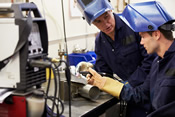WELDING: From Grit to Glory – The clean evolution of a once ‘dirty’ job
Doctors, lawyers, and accountants are often the preferred career choices for many young South Africans. But why are these seen as the only paths to career success?
Welding has long been perceived as a gritty, blue-collar trade, but this perception is rapidly changing. Welding, along with related professions, such as inspection, coordination and non-destructive testing (NDT), is now emerging as a sophisticated, high-tech profession essential to many industries. Here’s why welding is a dynamic field brimming with opportunities and advancements.
Technological advancements and automation
 One of the most significant factors contributing to the changing perception of welding is the advent of technology and automation. Modern welding is now heavily integrated with computer-aided design (CAD) systems, robotics, and artificial intelligence (AI). These advancements have transformed welding from a manual, labour-intensive task into a precise, automated process.
One of the most significant factors contributing to the changing perception of welding is the advent of technology and automation. Modern welding is now heavily integrated with computer-aided design (CAD) systems, robotics, and artificial intelligence (AI). These advancements have transformed welding from a manual, labour-intensive task into a precise, automated process.
Robotics, in particular, have revolutionised the industry by taking on repetitive and dangerous tasks, thus improving safety and efficiency. This integration of technology elevates the precision and quality of welds and requires a higher level of skill and expertise from workers, making welding a sophisticated profession.
Career opportunities and economic impact
It’s therefore clear that the welding industry offers numerous career opportunities, contrary to the outdated stereotype of welding as a dead-end job. In fact, “dirty skills,” including welding, plumbing, electrical work, and other hands-on trades, are vital for the growth of the South African economy. These skills form the backbone of the country’s industrial and infrastructure development. Here’s why these essential trades are so critical:
1.Building and Maintenance of Infrastructure – The development of infrastructure such as roads, bridges, schools, and hospitals rely heavily on skilled tradespeople. Welders, electricians, and plumbers are crucial in constructing and maintaining these essential facilities, fundamental to economic development and improving the quality of life for South Africans.
2.Supporting Manufacturing and Industrial Sectors – Manufacturing and heavy industries are significant contributors to South Africa’s GDP. Skilled tradespeople ensure that factories and plants operate smoothly and efficiently, reducing downtime and increasing productivity. Welding is indispensable in the fabrication and maintenance of machinery and equipment.
3. Job Creation and Skills Development – The trades provide numerous employment opportunities and are essential for reducing unemployment rates. By investing in training and development for welding and related personnel, South Africa can create a skilled workforce capable of meeting the demands of modern industry and securing quality jobs – not unskilled poorly paying positions. This boosts individual livelihoods and contributes to overall economic stability and growth.
4.Fostering Innovation and Sustainability – Trades such as welding are at the forefront of innovation, particularly in areas like renewable energy. The skills of welders are critical in building and maintaining wind turbines, solar panels, and other green technologies. By fostering these trades, South Africa can advance its sustainability goals and reduce its environmental footprint.
5.Empowering Small and Medium Enterprises (SMEs) – Many SMEs in South Africa operate within the trades, providing essential services and contributing to local economies. Skilled tradespeople often become entrepreneurs, starting their own businesses and creating jobs within their communities. This entrepreneurial spirit drives economic growth and fosters a resilient economy.
Education and Training
 The perception of welding is also being reshaped by the emphasis on education and training. Institutions like the SAIW as an Authorised Nominated Body (ANB) of the International Institute of Welding (IIW) are at the forefront of providing world-class training and certification programs. These programs equip welders, inspectors and coordinators with internationally recognised qualifications to the the latest skills and knowledge, ensuring they are prepared to meet the demands of modern industry. Additionally. NDT personnel benefit from the ICNDT Mutual Recognition Agreement, further enhancing global employability. The shift towards formal education and continuous professional development has elevated the status of welding, making it a respected and desirable career choice.
The perception of welding is also being reshaped by the emphasis on education and training. Institutions like the SAIW as an Authorised Nominated Body (ANB) of the International Institute of Welding (IIW) are at the forefront of providing world-class training and certification programs. These programs equip welders, inspectors and coordinators with internationally recognised qualifications to the the latest skills and knowledge, ensuring they are prepared to meet the demands of modern industry. Additionally. NDT personnel benefit from the ICNDT Mutual Recognition Agreement, further enhancing global employability. The shift towards formal education and continuous professional development has elevated the status of welding, making it a respected and desirable career choice.
Innovation and sustainability
 Welding is at the heart of innovation and sustainability efforts. As industries strive to reduce their environmental footprint, welding technologies are evolving to support this goal. For instance, advancements in laser welding and friction stir welding are improving efficiency and reducing waste and energy consumption. These innovations align with global sustainability goals and demonstrate that welding is a forward-looking field, essential for a sustainable future.
Welding is at the heart of innovation and sustainability efforts. As industries strive to reduce their environmental footprint, welding technologies are evolving to support this goal. For instance, advancements in laser welding and friction stir welding are improving efficiency and reducing waste and energy consumption. These innovations align with global sustainability goals and demonstrate that welding is a forward-looking field, essential for a sustainable future.
No longer a dirty word in the world of work
In conclusion, welding is no longer a “dirty word” in the world of work. It is a vital, innovative, and dynamic profession that plays a crucial role in modern industry. The integration of technology, enhanced safety standards, significant economic impact, and emphasis on education and training have all contributed to transforming the perception of welding. As we continue to advance and innovate, the importance of skilled welders will only grow, solidifying welding’s status as a cornerstone of progress and development.
At the Southern African Institute of Welding, we are proud to support and promote the welding profession, ensuring it continues to thrive and evolve in the 21st century. Welding is not just a job; it is a career, a craft, and a crucial component of our industrial future. In South Africa, as in the rest of the world, the welding industry is paving the way for a stronger, more innovative, and sustainable tomorrow.


